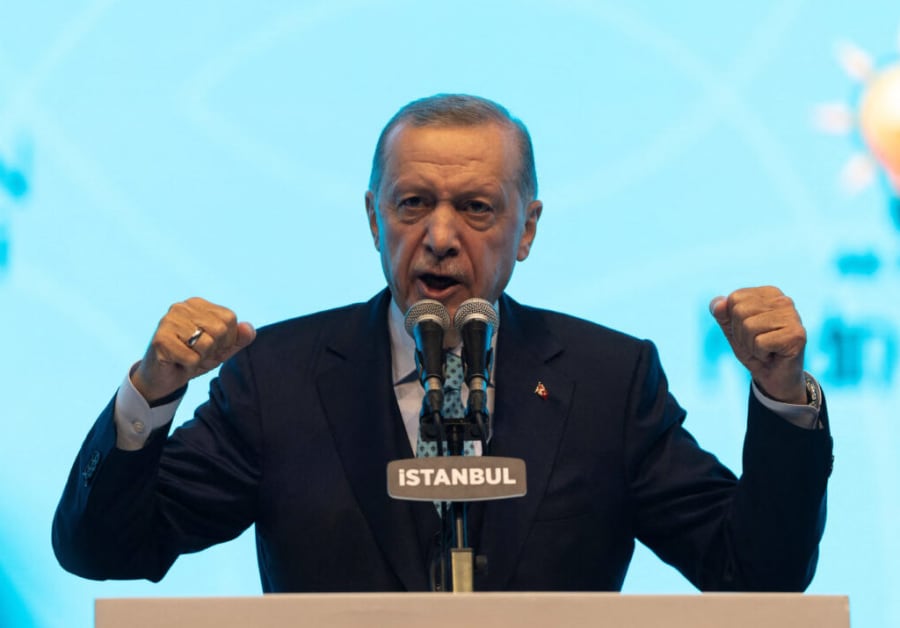Erdoğan’s history and recent statements show why Turkey can never be a partner to Israel under his rule
An increasingly Ottoman-inspired Turkey under Erdoğan represents a real threat to Israel and the Middle East

Recent statements by Turkish President Recep Tayyip Erdoğan have poured cold water on the hope of many Israelis, and others, who had hoped the Abraham Accords peace agreements would have a calming influence on Turkey and bring it once more into friendly relations with Israel.
Partially due to the work of Israeli President Isaac Herzog, Israel and Turkey had begun to see a thaw in the chilly relations, and a resumption of joint diplomatic activities.
During the devastating earthquake in Turkey earlier this year, Israel was one of the first nations to respond with aid and search and rescue teams.
Turkish-Israeli relations were severely damaged by the Gaza Freedom Flotilla event in 2010.
The relations had already been “on life support” since Operation Cast Lead in 2008, according to Israeli analyst Haim Malka. That operation involved Israel's invasion of Gaza in an attempt to stop the barrage of Hamas-launched rockets from the Gaza Strip.
Following that operation, Israel imposed a naval blockade of Gaza to stop rocket-production supplies from entering the Strip.
In 2010, a Turkish humanitarian aid group, along with a group called the Free Gaza Movement, sent a flotilla of ships to Gaza, despite the blockade.
Israel warned the ships not to attempt to break the blockade, saying it would consider the act a “provocation.”
The excessive use of force against the crew of the ships caused international outrage and led to a severe cooling of relations between Turkey and Israel, despite several attempts by Prime Minister Benjamin Netanyahu to smooth things over.
Later, after a visit to Turkey by President Herzog in 2022, relations appeared to be improving.
The two nations exchanged ambassadors for the first time in over a decade earlier this year.
Erdoğan has refused to call Hamas a terror organization in recent days, saying, “Hamas is not a terrorist organization, it is a liberation group, mujahideen waging a battle to protect its lands and people.”
However, this realization should be no surprise for anyone who has followed Erdoğan’s proclamations or his path to power.
ALL ISRAEL NEWS Editor-in-Chief Joel Rosenberg warned about Erdoğan’s false friendship with Israel in his book ENEMIES and ALLIES, calling the Turkish leader “a wolf in sheep’s clothing.”
Erdoğan has been in political power for some 20 years. As with many authoritarian figures, like Russian President Vladimir Putin, Erdoğan has swapped roles between prime minister and president, as he has continued to concentrate more and more power under his authority.
He first gained international attention after the founding of the “moderate” AKP (Justice and Development) party, which was meant to resemble the religiously sympathetic, but secular democratic conservative parties like Europe’s Christian democratic parties.
That 'liberal politician' image was quickly abandoned. After his party won the elections, the law preventing him from serving as prime minister was overturned, allowing him to take office in 2003. In 2014, after winning the presidency, Erdoğan changed the structure of the government from a parliamentary system to a presidential system and began to increase the powers of the executive branch, while reducing the power and influence of the Turkish military, which had previously prevented the country from straying too far into Islamic revolutionary directions.
A failed coup attempt in 2016 afforded Erdoğan the opportunity to purge opponents and perceived opponents from government positions.
Erdoğan’s political history provides clear indication of the path he is forging for himself and the nation of Turkey.
As he gained power, he began to reveal his political philosophy, which has been described by many analysts as neo-Ottoman.
For Erdoğan, the glory of Turkey lies not in the Republic of Turkey, but in the Ottoman past.
This assessment is not one that only became obvious in light of Erdoğan’s recent comments.
In 2013, The Atlantic ran a story about Erdoğan’s changes and reforms in Turkey, calling him “Sultan Erdoğan.”
Cinar Kiper, a Turk, lived through Erdoğan’s changes.
Kiper, however, followed Erdoğan’s misdirection, claiming he was interested in a Meiji Restoration style revolution, not a true return to the Ottoman past.
The Meiji Revolution was an attempt to blend Western technological, scientific, industrial and military advancements, while keeping the Japanese culture and values. Kiper claimed that Erdoğan sought to accomplish something similar in Turkey; combining nostalgia of the past, with Atatürk’s Western Kemalist revolution.
Another decade of Erdoğan in office has shown that assessment to be wishful thinking at best.
Erdoğan’s Ottoman adoration has gotten stronger, and his language about the glory of the lost empire has gotten even more fiery.
There were already troubling signs about Erdoğan’s goals for the country.
One year after the Atlantic story, The Wall Street Journal published a piece called, “Turkey’s New Sultan.”
Instead of discussing Erdoğan’s love of Ottoman nostalgia, the WSJ noted the brutal crackdowns against protesters, the firing of thousands of judges, prosecutors and police officers, and the world’s largest jailor of journalists in 2012 and 2013.
That article called out Erdoğan’s backing of Hamas early on, and noted how it enabled Iran’s attempts to evade Western sanctions, both troubling moves for a NATO member.
Later that same year, National Public Radio published an article about the completion of the Presidential Palace outside the capital city of Ankara, which was introduced to a background of Ottoman-style music.
A Turkish architect quoted in the article described the building’s style as a blend of Ottoman and “Hitler-era fascist” styles.
Articles referring to Erdoğan as “sultan” continued after 2014. In 2015, The Independent called him, “the president who would be sultan.”
It is not only concerned Westerners say that Erdoğan desires to be sultan, or that he desires to revive the Ottoman Empire from its fatal head wound.
A 2019 opinion piece for the Malaysian Institute of Defense and Security (MiDAS), openly raised the issue of a neo-Ottoman Empire, referring to Erdoğan as “the new Caliph of Muslims” and “a Muslim model.”
The opinion piece, titled “2023: End of the Treaty of Lausanne,” praised Erdoğan’s revival of Muslim rules, reverting the Hagia Sophia (originally a church built by the Byzantine Emperor Justinian in the 6th century) to a mosque, and for developing a thriving Muslim film industry.
The Treaty of Lausanne established the national boundaries of Turkey following the British defeat of the Ottomans and placed certain restrictions on the nation's oil and gas rights in the Black Sea.
To understand the implications of that treaty ending, it is worth quoting a few lines from article issued by the Malaysian Institute of Defense and Security
“With the expiration of the treaty after 100 years, Türkiye will be able to conduct oil and gas activities such as drilling in the Black Sea.”
“Booming economic prosperity awaits Türkiye in 2023, the energy sector where Türkiye would no longer depend on Russia, Azerbaijan and Iran. With economic prosperity, Türkiye can rise as the region's most influential and influencing country. The rise of the new Türkiye will bring another dimension and more dynamic geopolitics, especially regarding ideology.”
“With the revival of Türkiye, the Muslim world are [sic] in a position to claim back its reputation. Türkiye will lead the Muslim world once again if on the right track.”
“Will Türkiye be able to realise its dream to be a leader of Muslim countries once more as how the Caliphate fell sadly in Türkiye? It will rise proudly in Türkiye.”
We have nothing similar to the Islamic caliphate in Western history, except the Roman Empire.
Even more than the Roman Empire dominates the history and thinking of Europe, the Islamic Caliphate dominates the dreams of many Muslims, as the rise of the Muslim Brotherhood, al-Qaeda and the rapid rise of ISIS, demonstrate.
While ISIS, under Abu Bakr al-Baghdadi, did not capture the hearts of the Muslim world, partially due to its glorification of brutality even against Muslims, the willingness of some in the Muslim world to accept Hamas’ use of the same brutality against Israelis shows that many in the Muslim world have not repudiated such tactics.
Erdoğan, with his slow, steady drive to restore the Ottoman ideal to the Turkish people, and open talk of restoring Turkey to historical greatness, may be successful in the way that ISIS was not.
Modern Diplomacy published an analysis in 2020 detailing Erdoğan’s work “to regain lost glory of Muslims by breathing into a dead Empire.”
In that work, Abdul Rasool Syed warns: “It is quite evident through his policies as well as orientations that he is paving the way to reclaim Ottoman Empire by hook or crook no sooner does the treaty of Lausanne go dead by 2023.”
In accordance with his opinion regarding the significance of Turkey historically and in the future, Erdoğan has pursued agreements with Russia and Iran, and openly violated the territorial integrity of Syria to regain land he considers to be Turkey’s by historical right.
He has also used proxies in Syria, Libya and other hotspots.
Many Western leaders missed the significance of Erdoğan restoring the Hagia Sophia to a mosque. It was a deliberate part of his attempt brand the Ottoman Empire as good for Turkey and good for the region.
With the Treaty of Lausanne expiring this year, the question of whether the Ottoman Empire will recover from its fatal wound and rise from the dust of history may no longer be an academic one.
A militant Turkish military carrying out exactly the same style of bombing campaign in Syria and the Kurdish territories of Iraq – as Israel is doing in Gaza – is a concern for the region, but especially for Israel.
Veteran Middle East correspondent Seth Frantzman labeled Turkey under Erdoğan: “The most dangerous player in the Middle East” because of its aggressive stance and brutal military incursions into Kurdish territories in Syria and Iraq.
Erdoğan, himself, seemed to imply such a threat recently. The day before the 100-year anniversary of the modern Turkish state, Erdoğan held a rally in support of the Palestinians in Gaza.
In the rally, Erdoğan said that Gaza was a part of “our homeland,” a reference to the Ottoman period.
“Gaza was an inseparable part of our homeland in the past. Our hearts are wrenching for what is happening in Gaza,” Erdoğan said.
He also appeared to threaten Israel in two different comments.
"We are such a great nation and state that our strength, our problem, our struggle is not only limited to our borders,” he stated.
While a little later, he added, “From now on, we will continue on our path with the motto that we may suddenly knock on your door one night.”
If Erdoğan’s attempts to spread his neo-Ottoman ambitions to the East do pay off, Israel could find itself losing strategic partners.
Burak Bekdil, a veteran Turkish writer, warned of the Ottoman ambitions in a piece for the Gatestone Institute.
“Obsessed with reviving Turks' imperial days of glory, Erdoğan is turning to Turkey's east to create a pan-Turkic/Islamist strategic alliance consisting of Turkey, Azerbaijan and Pakistan, with part-time, tactical alliances with Iran, Qatar and Bangladesh.”
But more than that, Israel may find itself threatened by Turkey sooner than it expects. It needs to begin preparing for that reality, or else the threat from the north may not just be Hezbollah.

J. Micah Hancock is a current Master’s student at the Hebrew University, pursuing a degree in Jewish History. Previously, he studied Biblical studies and journalism in his B.A. in the United States. He joined All Israel News as a reporter in 2022, and currently lives near Jerusalem with his wife and children.














